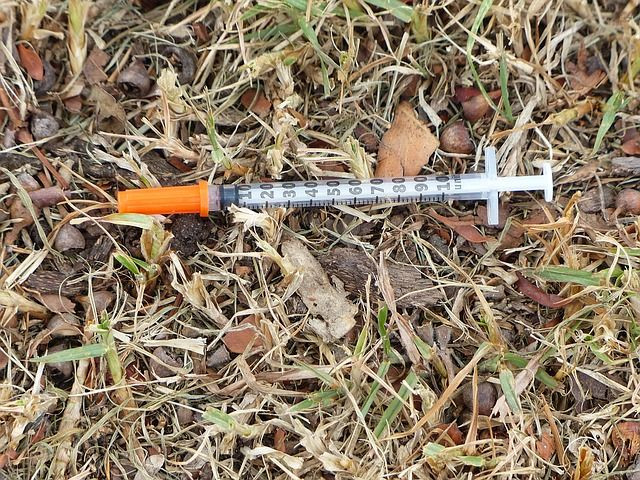Heroin Addiction Research: Vaccine Blocked Drug’s High In Monkeys, May Prevent Relapses

If you could no longer feel the pleasant effects of a drug, would you still be tempted to use it? This is the idea that inspired a team of researchers from The Scripps Research Institute to develop a heroin "vaccine.” Theoretically, the vaccine would prevent an individual from feeling heroin’s high, making it less likely for the user to relapse. The vaccine recently proved effective on monkeys, and the team believe it's only a matter of time before they move on to humans.
The vaccine is the first of its kind to prove effective in primates in recent clinical trials. This is an important step towards creating an eventual heroin vaccine that would prevent the drug’s euphoric effect.
“We were really encouraged to see the vaccine produce such lasting effects in non-human primate models,” said researcher Paul Bremer in a recent statement. “These steps let us put our best foot forward when we went into the primate study.”
Read: Heroin Overdoses In The US; Why Drug Abuse Epidemic Skyrocketed In Recent Years
The vaccine works by exposing the patient’s immune system to a molecular component of heroin to teach the immune system to produce antibodies against it. These antibodies prevent heroin’s psychoactive effect, preventing it from giving users a high. The vaccine has previously proved effective in rodents, and as seen in the most recent clinical trial, is also effective in primates, specifically rhesus monkeys.
Four monkeys were given three doses of the vaccine; the vaccine’s effect was most apparent in the first month, but lasted for over eight months. In addition, there seemed to be no negative side effects of the vaccine. Results also suggested that the vaccine may be able to give humans a long-term immunity to heroin, as there is evidence that the immune system retains a memory of the vaccine.
Heroin use in the U.S. continues to grow, and is now the leading cause of death in Americans under 50, causing more deaths than car accidents and gun violence, The Huffington Post reported. Although there are treatments available for heroin abuse, these are only temporary and there is a 70 to 90 percent relapse rate, as well as a heightened risk of overdose, The New England Journal of Medicine reported.
Not only does heroin use directly lead to death among users, but it is also behind increases in other health conditions, such as HIV and hepatitis. For example, according to the Centers for Disease Control and Prevention, the number of new hepatitis C cases increased by 300 percent between 2010 and 2015, with increased prevalence of needle sharing among heroin users believed to be the likely culprit, NPR reported.
The proposed heroin vaccine would only be effective on heroin, not other synthetic opioid medications. This is important, as it would not interfere with the need of such medications for emergency medical uses.
Of course, just because we can create a vaccine against heroin doesn’t mean it’s guaranteed to work in a real-life setting. Percy Menzies, President of the Assisted Recovery Centers of America, a treatment center for individuals with drug and alcohol addiction, told Medical Daily he believes a vaccine is not the right route for addressing the current heroin problem in our nation.
“When it comes to addiction disorders, the behavioral aspects is very important,” Menzies told Medical Daily. “These addictive disorders are like a parasite on the survival instincts, telling the individual you don’t need anything else, just take care of me. Mentally a vaccine is seen as a form of punishment or torture.”
Menzies worries that the vaccine could seriously increase the risk of accidental overdose.
“The effects of heroin are hardwired into the memory of patients. If they are going through a stressful situation this may trigger cravings. They want to use heroin but the vaccine prevents this. Instead, they will think, 'Let me take a bigger dose,'” explained Menzies. “This is the biggest danger with the vaccine, the potential to overdose [which may] lead to fatality.”
Instead of such an extreme and arguably impractical solution, there are other drugs available that may reduce the likelihood of relapse, such as Naltrexone, which Menzies describes as being “like a vaccine.” This drug also works by blocking heroin’s pleasurable effect on the brain, in turn reducing the desire to use again, but for a much less permanent amount of time.
When it comes to treating any form of addiction, pharmaceutical solutions only play one small role in the road to recovery, and it’s important not to overlook the importance of counselling, behavioral therapy, and of course personal lifestyle changes.
Upate: This article has been updated to include the interview with Mr. Menzies.
Source: Bremer PT, Schloesburg JE, Banks ML, et al. Development of a Clinically-Viable Heroin Vaccine. Journal of the American Chemical Society . 2017
See Also:
Who Is Using Heroin? Portion Of Americans Using The Drug Increased Fivefold In Last Decade



























